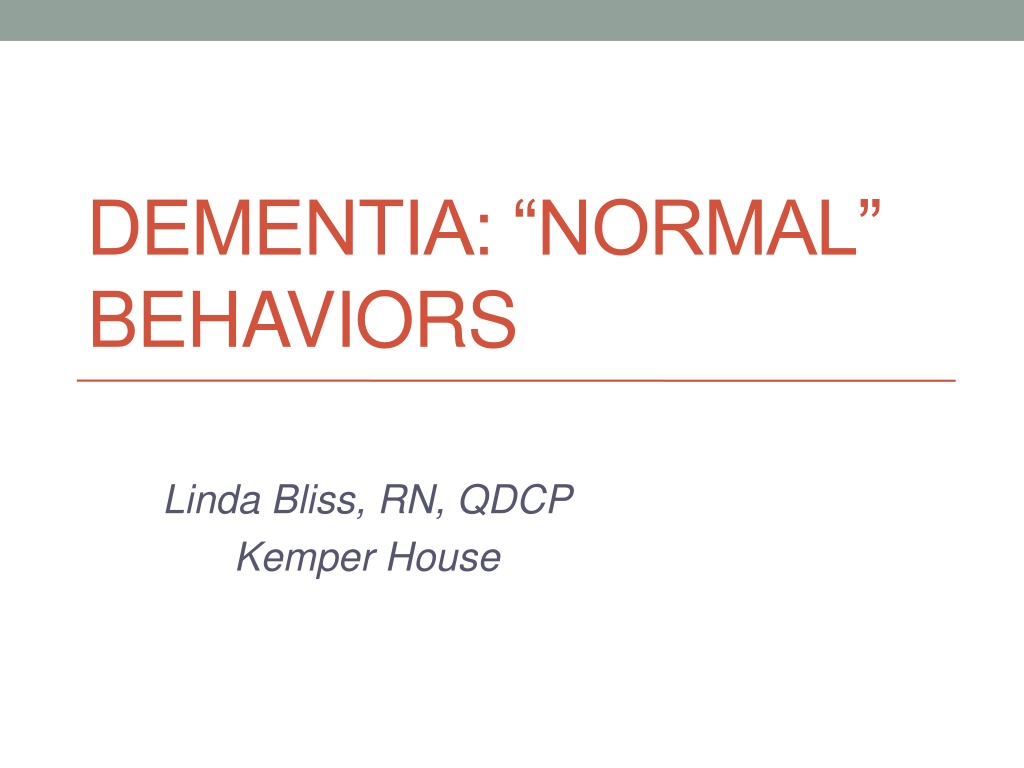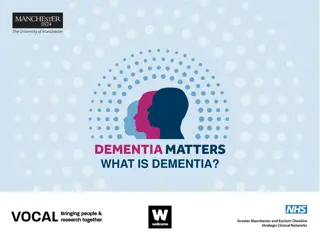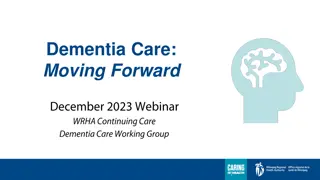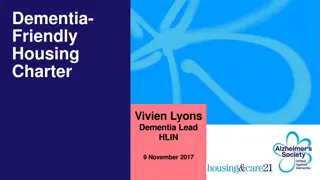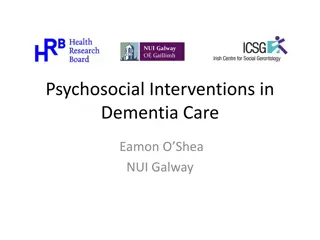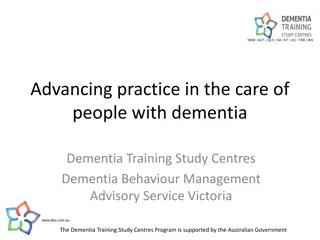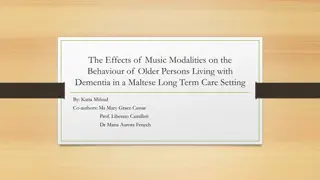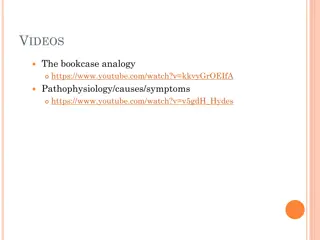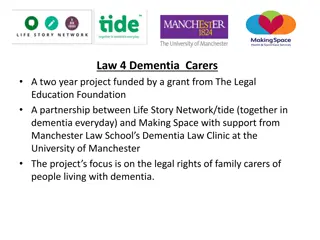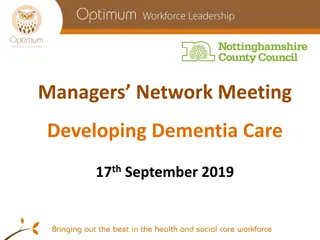Understanding Normal Behaviors in Dementia Care
Dementia presents a range of normal behaviors that can be challenging for caregivers. By learning to identify triggers, interpret communication, and respond effectively, caregivers can provide better support for individuals with dementia. This session explores common behaviors like aggression, wandering, and mood swings, emphasizing the importance of recognizing these behaviors as forms of communication rather than mere disruptions. Understanding the underlying reasons behind such behaviors, such as unmet needs or anxiety, can lead to more compassionate and appropriate responses in dementia care.
Download Presentation

Please find below an Image/Link to download the presentation.
The content on the website is provided AS IS for your information and personal use only. It may not be sold, licensed, or shared on other websites without obtaining consent from the author. Download presentation by click this link. If you encounter any issues during the download, it is possible that the publisher has removed the file from their server.
E N D
Presentation Transcript
DEMENTIA: NORMAL BEHAVIORS Linda Bliss, RN, QDCP Kemper House
Goals and Objectives By the end of the session you will be able to Identify different types of normal behaviors Identify what may trigger these behaviors Restate what the behaviors are trying to communicate Respond appropriately and effectively to these behaviors
What is Dementia? Dementia is a symptom of a disease process Alzheimer s Disease is the cause of 80% of all dementias The symptoms are such that they interfere with the person s ability to function in every day life People with dementia no longer have inhibitions learned in early childhood
What Are Normal Behaviors? Verbal/physical aggression Repetitive questions and actions Wandering, exit seeking Delusions/Hallucinations Catastrophic Reactions Sundowning Hoarding, rummaging, hiding things Mood Swings What do you mean that s normal?
All Behaviors Are A Form Of Communication! WHAT ARE THEY TRYING TO TELL US?
What Are They Trying To Tell Us? (Common Triggers) They have unmet needs They are anxious about an upcoming event They have a fear of being alone, looking for a loved one, looking for home They feel frightened or humiliated They feel frustrated The dementia has eroded their judgment and self-control Their independence or privacy has been threatened They are in physical discomfort or having pain
BEHAVIOR MAY BE DUE TO PAIN! People with dementia definitely feel pain!
Verbal/Physical Aggression What happened just before the aggressive or combative behavior? Consider the 5 W s (where, when, who, what, why) Watch for early signs of potential combative behaviors Know the common triggers What works today may not work tomorrow
Early Warning Signs of Aggressive/Combative Behaviors When they say No they mean No Restless, nervousness, agitation Annoyance Arguing Frustration Pacing Raising a hand Throwing something Verbal outbursts
Repetitive Questions Why do they remember the questions and not the answer? They repeat themselves because they have dementia! They are seeking reassurance rather than seeking information! Inability to judge time Separation from loved ones Inability to store and retrieve information
REPETITIVE QUESTIONS It maybe the 10thtime you are hearing it, but it s the 1sttime they are asking it! Remember, repetitive questions are normal !
Repetitive Actions Boredom Side effects of medications It s a way of reassuring self, ex: rocking back and forth May be a meaningful task May be a task associated with a former job or hobby If it s not hurting anyone, don t fix it!
Wandering, Exit Seeking Looking for a loved one Looking for home They have a need unmet Looking for the bathroom Need to get to work Do not open door if someone is standing there waiting to leave Validate and Redirect
Hallucinations Caused by changes within the brain Experienced through one of the five senses Most common are visual or auditory False perceptions/misinterpretations They see a rabbit on the couch They hear a baby crying They see a stranger in the mirror
Assess and Respond to Hallucinations Is this upsetting to the person or for you? Is it leading them to do something dangerous? If it doesn t cause a problem, don t fix it Don t argue about what they see or hear Reassure and redirect Walk with them in their world! Validate! Their reality is not our reality
Delusions Something a person believes to be true False beliefs caused by deterioration of cognitive processes in the brain Can be influenced by misunderstandings or misinterpretations It s normal for someone with dementia!
Most Common Delusions Spouse is being unfaithful Their home is not their own Someone is stealing their money Someone is trying to harm them or poison them Someone is spying on them
Responding to Delusions Don t argue or try to convince Reassure, redirect You don t have to agree, but you do have to validate Let them know you want to help; Is there anything I can do to make you feel more safe? Always protect yourself
Catastrophic Reactions Making a mountain out of a mole hill! Over reacting to a seemingly normal, nonthreatening situation Their reality is distorted and overwhelming feelings are normal Most often occurs around dinner time or evening Delusions can also make people more fearful causing catastrophic reactions
Try to Prevent Catastrophic Reactions Don t argue or try to convince Don t criticize or belittle Avoid over fatigue Keep tasks simple and one step Be aware of the triggers
Sundowning A group of behaviors occurring at the time of nightfall or sunset Increased confusion, agitation, aggression, pacing wandering The specific causes have not been proven. Some evidence suggests that the disruption of circadian rhythm enhances the behaviors.
Things You Can Try To Manage Sundowning Consistent sleeping schedule and daily routine Limit caffeine Keep rooms well-lit, try to avoid shadows
Hoarding and Hiding Take collecting to the next level Failing to throw out large numbers of stuff Hours spent collecting stuff Were they a pack rat ? Did they grow up in the depression or during wartime? Fear of being robbed Security the more the better Everything is fair game! They don t realize taking things that are not theirs is wrong. They are not stealing they are merely shopping !
What Do People Hoard? Food Garbage Newspaper, magazines, junk mail Silverware Plastic bags Old clothes Paper products Stuff!
Rummaging A constant, driven, searching through belongings and stuff Hours spent looking for important items such as keys, bills, money Catastrophic reactions when they can not find what they are searching for Forget what they are looking for Loss of object identification
Interventions for Rummaging Lock valuables in a safe place Always check wastebaskets before throwing out trash When you find a hiding place, check it often Know where to look, refrigerator, freezer, sugar bowl, under cushions, in shoe boxes When decluttering, provide lots of emotional support
Mood Swings Decreased coping mechanisms Decreased self control Folks are most often acting out of a sense of fear, feelings of persecution, a feeling of losing control, frustration
Tackle The Triggers Always GREET before you TREAT (Teepa Snow) Try to met their needs (do they have enough to eat and drink, do they need to use the bathroom) Reduce demands and have a stress-free routine Give them plenty of time to respond (10 second rule) Give time outs Do not be authoritative or criticize Provide a safe and calm environment Assess for pain or discomfort
When Do We Need To Treat The Behaviors? When it is distressing to the person When it can cause harm to the person or others When it impairs self care, social interactions, or participation When it effects quality of life These behaviors are normal for someone with dementia
